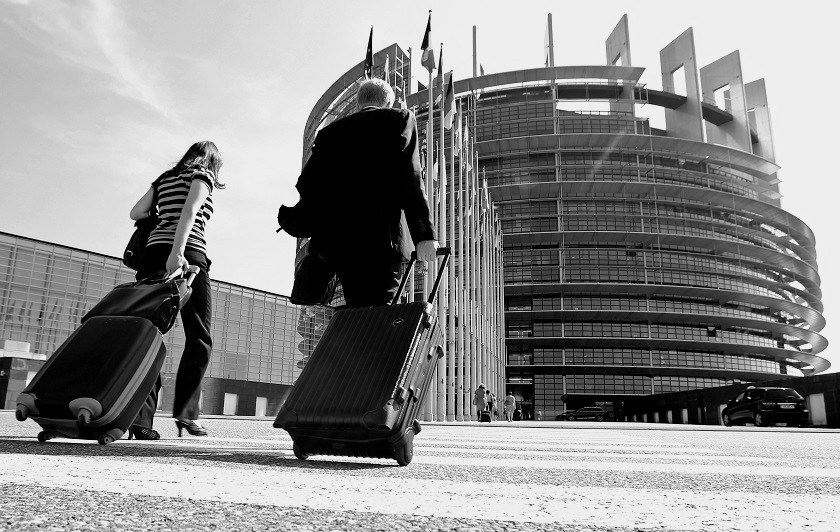BRUSSELS BEHIND THE SCENES
Weekly analysis and untold stories
With SAMUEL STOLTON
Other Brussels behind the scenes stories:
Barnier's last throw of the dice
Why Macron is banking on the Conference on the Future of Europe
The Enemies of European Football
The slow death of April Fools' day
Hauled back to Strasbourg
For many months, Parliament President Davide Sassoli has managed to stall the French. That is, until next week.
Long have President Macron's government tolerated, through gritted teeth, the ‘force majeure' imposed by Sassoli during the coronavirus outbreak, which saw Parliament's monthly Strasbourg session take place from Brussels.
BRUSSELS BEHIND THE SCENES is a weekly newsletter which brings the untold stories about the characters driving the policies affecting our lives. Analysis not found anywhere else, The Brussels Times' Samuel Stolton helps you make sense of what is happening in Brussels. If you want to receive Brussels behind the scenes straight to your inbox every week, subscribe to the newsletter here.
And while the French had endured, against their will, the moratorium on Parliament's sojourn to Strasbourg, they have not held their delight back at the fact that next week, the European Parliament’s travelling circus is once again free to hold its monthly plenary session in the city.
In a recent interview with regional newspaper, the Dernières nouvelles d'Alsace, President Macron spoke of the importance of the ‘Strasbourg’ dimension of EU institutional affairs.
"If Brussels is the capital of Europe's offices, Strasbourg is the capital of its heart and soul: where it is where its values are defended," French broadcaster RFI reported the President as having said, adding that the Elysée had been unambiguous in their welcome of the move back to the city.
Regular readers to this column will know well the centuries-deep historical and cultural endearments that the French have in the city of Strasbourg. The country has long prized the European Council conclusions from the 1992 Edinburgh Summit, which provided for Strasbourg to hold 12 monthly plenary sessions per year. The commitments were later annexed to the 1997 Treaty of Amsterdam.
But since then, there has been no shortage of those calling for the treaties to be changed, and for the travelling circus to be scrapped.
Lithuanian MEP Rasa Juknevičienė, who has a background in the health profession, recently spearheaded a petition to galvanize support among MEPs against Sassoli’s capitulation to the French.
Over 60 MEPs signed the letter, which accused the decision to resurrect the Strasbourg trip as “too hasty” and putting the “staff of the European Parliament under unnecessary risk.”
More broadly, critics have traditionally cited the environmental impact of the 2,500 individuals who make the monthly journey, as well as the cost, pitched at €114 million per year, as reasons why the trip should be binned.
For the city itself, Mayor of Strasbourg Jeanne Barseghian is aware of the many benefits that the Strasbourg seat brings to the local hospitality industry and has attempted to allay fears emanating from European Parliamentarians.
Next week, such attempts will include the enticing offer of an on-site vaccine center at Strasbourg’s Parliament premises, which will provide inoculations for members and staff in attendance.
And despite the fact that those travelling to Strasbourg may be able to jump the queue in terms of access to vaccines that may have been hard to find elsewhere, for the most part Parliamentarians are not convinced.
MEP Witold Wasczykowski of the European Conservatives and Reformists Group told Reuters that the only option should be to cancel the trip, while MEP Iratxe Garcia, president of the Socialists and Democrats, said that there is more of a consensus among MEPs for postponing the Strasbourg trip until July.
The issue has been exacerbated further due to the fact that on their return to Brussels, should staffers and members have been in Strasbourg for over 48 hours, they will be required to quarantine.
Next week, it is unlikely that many will travel to Strasbourg for the European Parliament’s plenary. With opposition to the move arising from all political corners of the Parliament, there is the very real risk that it turns into somewhat of a ‘shadow session’ where the majority of members chose to participate virtually, as part of a hybrid setup.
However, with every plenary that passes without members in the chamber, it is clear that the French will become more and more impatient over time. But then again, this impatience will only be matched by those on the other side of the debate, who call for the Strasbourg seat to be scrapped for good.
BRUSSELS BEHIND THE SCENES is a weekly newsletter which brings the untold stories about the characters driving the policies affecting our lives. Analysis not found anywhere else, The Brussels Times' Samuel Stolton helps you make sense of what is happening in Brussels. If you want to receive Brussels behind the scenes straight to your inbox every week, subscribe to the newsletter here.

